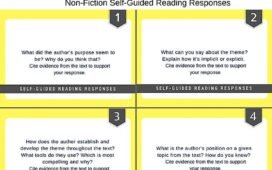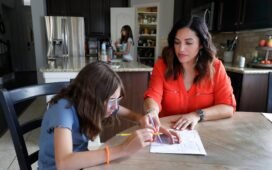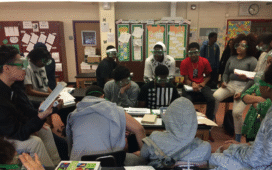Reading also enables students to make broader connections to the world, whether it has to do with global events, personal conflicts, or societal dynamics. These connections to real life events are called text-to-world connections. According to a recent study, students engage more deeply when books have diverse characters and relatable topics.
Jackson recalled teaching Lord of the Flies to her high schoolers. “It’s just such a cool and very important book about governing and groupthink,” she said. Through class discussions about personal experiences and acting out sections from the book, her students saw parallels between the characters’ experiences and situations they observe around them.
Books also teach students to recognize how events unfold. “You’re noticing foreshadowing from chapter one, and then seeing it all come together in chapter 16,” Jackson noted as she recalled the excitement students will feel when they recognize a connection.
This emotional engagement helps students develop skills beyond reading, such as navigating nuanced arguments and reflecting on their own experiences, Horowitch said. Reading fiction is shown to make people more open to changing their minds —a valuable trait, especially as empathy-related activities like volunteerism decline and issues such as bullying increase.
Building Endurance
Reading entire books strengthens students’ endurance and focus, according to Horowitch.
“It’s really a skill to stay on one task for an extended period,” she said, sharing a professor’s observation that some students even struggle to focus on a 14-line sonnet.
While technology’s role in diminishing attention spans isn’t definitive, studies suggest people read more deeply in physical books than on digital devices, which can distract with notifications. Although students might read more than ever through social media, the fragmented format doesn’t build reading stamina. “I don’t think anybody’s deep-reading Twitter comments,” Horowitch said.
“You’re good at what you practice. And the more time you spend reading these really small snippets of little words, whether it’s an Instagram comment or watching a TikTok video, that’s just what you’re used to,” said Horowitch. She added that sometimes it can be hard to read something that isn’t immediately rewarding the way that social media is. Students also spend more time on social media than they ever have before, leaving less time for reading for fun.
It is possible to gain that reading stamina back. Horowitch said that some people have experimented with committing to read a certain amount of pages and then steadily increasing the number of pages they read in one sitting. Danielle also said that it could be helpful for teachers to relate to students’ experiences when they struggle with a text. “When I read this in school, it kind of threw me off, too,” she would say, “But I’ve got you. I’m here with you.”
Episode Transcript
This is a computer-generated transcript. While our team has reviewed it, there may be errors.
Nimah Gobir: Welcome to MindShift. Where we discuss the future of learning and how we raise our kids. I’m Nimah Gobir. You might’ve heard about The Atlantic article making waves lately. The headline? Some students—even those at elite universities—are struggling to read entire books. Whether you’ve read it yourself or just caught bits of the buzz, we’re here to break it down and get to the core of what’s really going on. Is this a crisis we need to worry about? Or is it just headline hype? Rose Horowitch wrote the article.
Rose Horowitch: I write primarily about education with some politics and general interest stories mixed in. I kept hearing scattered reports from professors that they were really noticing a change in their students reading habits over the past decade. And I was curious to see, you know, whether this was something that just a few people were experiencing or whether it was a much broader phenomenon.
Nimah Gobir: Rose talked to professors and learned that it wasn’t that college students don’t know how to read.
Rose Horowitch: Their students are literate, you know, they can decode words and read sentences, but they have much narrower vocabularies than they used to. They really struggle digging into a text, getting through a text that might, you know, be sort of challenging that they kind of reached their limit much earlier, that they struggle to and even deal sort of with the architecture of a book and focus on small details while keeping in mind the overall plot and how they fit together.
Nimah Gobir: And surprisingly, it’s not just books that students are struggling with.
Rose Horowitch: One thing that was sort of jaw-dropping for me was speaking with the chair of Georgetown University’s English department, and he was saying that he really notices these changes even when students are reading a sonnet and that, you know, it can be you can be reading something that’s 14 lines and it’s still just can be really hard for them to focus on it and get through it and really wrestle with it.
Nimah Gobir: I asked Rose about the possible causes, and one was a usual suspect: digital media and technology.
Rose Horowitch: In speaking with experts, you know, they definitely did think that smartphones and social media played a role. You know, it seems that there was some disagreement over whether smartphones are really kind of rewiring people’s brains.
Nimah Gobir: There are so many things that affect a person’s attention span, that it’s hard to definitively say tech hurts learning. However, research by the National Library of Medicine shows that some tech is designed to draw people’s attention. These are known as persuasive technologies.
Rose Horowitch: It’s always engaging, always fun. And so it’s very hard to to kind of read something that’s not immediately rewarding. And another aspect of that is just that it’s like being on your smartphone just takes up so much time that, you know, people also seem to be reading a lot less just for fun because, you know, they’re spending their time on social media instead.
Nimah Gobir: But, on the other hand, some literacy experts say we’re reading more than ever.
Rose Horowitch: Just in shorter bursts and, you know, with less kind of care. I mean, I don’t think anybody’s like deep reading their Twitter comments. Um There’s a lot of research that people sort of do tend to read more deeply when they’re reading on a print page instead of on a screen. Because it is really a skill to just stay on one task for an extended period of time.
Nimah Gobir: While it’s easy to blame technology, it’s not the only factor here.There’s also the role of schools and teaching. We’re going to take a quick break, and when we’re back, we’ll look at how education might be playing a part in this trend and what teachers can do to help. Stay with us.
Nimah Gobir: I thought we could just blame everything on tech and call it a day, but high schools and middle school play a role in students’ reading abilities too. The subtitle on Rose Horowitch’s article in the Atlantic says, “To read a book in college, it helps to have read a book in high school.” And when I saw that I got a little chill because It’s like when the character in a scary movie realizes the call is coming from inside the house… or should i say inside our grade school buildings?
Rose Horowitch: Professors that I spoke with also thought that the preparation that students were getting was, you know, an equally large, if not, you know, even more significant factor in it. There was a lot of emphasis, too, on, you know, preparing students for these standardized tests, you know, instead and just, you know, reading wasn’t something that was valued as much.
Nimah Gobir: For decades, standardized testing has emphasized shorter passages, encouraging teachers to focus on excerpts rather than full texts. But while this may boost test scores, it may also erode the endurance students need for book-length reading.
Danielle Bayard Jackson: It started because a teacher came to observe my classroom. She called me down the next day. She told me that she noticed I was reading full books with the students. She asked politely that I not do that.
Nimah Gobir: This is Danielle Bayard Jackson, talking about her experience as an English teacher.
Danielle Bayard Jackson: She suggested, “How about you read a chapter with the students and just summarize the rest? Because we’ve really got to focus on that test.” I think what’s so disturbing is you have teachers who are oftentimes not being treated like the experts that they are. I went to school for that. My degree is in that I know best practices. I know about how to maximize and optimize things for students’ learning.
Nimah Gobir: Danielle decided to push back.
Danielle Bayard Jackson: And it became a matter of personal integrity for me in that moment because I knew I was being asked to do something that would be that would be a disservice to my kids. I began to go to the library on campus and and ask the, you know, media center, you know, librarian, if I could get class sets of different books, one of them being Lord of the Flies. I mean, that is a classic. And it’s so much fun to read. And so I did that a couple times for months. And she was in on it with me. And I’m pushing the cart to the room and pushing it back so they don’t see class sets in my classroom. And a couple of months later, they called me down and they let me know that my students scored the highest in the school on that assessment. And they asked me, “What did you do? What’s the secret?” And I have goosebumps now even recalling the moment because I told them, I said, “We’ve been reading.”
Nimah Gobir: This raises the question: what’s lost when students can’t engage with full books? Is it really such a big deal?
Danielle Bayard Jackson: They don’t get a chance to develop a certain endurance, right, to stick with something over time. So that skill in and of itself is really important and is transferable to a lot of other spaces. It’s not about the book. It’s about all the things that come with journeying through a book. So the first is a certain mental endurance because it’s mentally laborious sometimes to read through a text. They also miss making exciting connections, you know, because maybe it takes us, you know, couple of weeks to read through a book, but it’s really settling in with you more deeply. You’re starting to make connections to it. To the outside world. You can think about things more deeply. You’re noticing foreshadowing from chapter one, something felt a little a little odd. And then we see it all come together in Chapter 16. Character development, right? So we’re watching this person, this character over time and how they change. And we can unpack that.
Nimah Gobir: It’s possible that the shift in reading habits has less to do with skills and more to do with values. Students today are more focused on getting ready to enter the workforce and may feel like they have less time for reading for reading sake. Danielle now has a job that is coveted by young people. She’s a TikTok influencer who makes videos about how women can develop better communication practices. I asked her if reading plays a role in her current work.
Danielle Bayard Jackson: I’m surprised to see that, you know, a lot of my after coming out of the classroom to see the way that my personal career journey has developed, you know, coaching people through friendships, studying friendship research, I didn’t see that for myself. I’m traveling across the country speaking and getting paid for videos on TikTok. I mean, that’s a part of it as a content creator, I suppose. I have to read those contracts, which are lengthy. I have to, you know, read through the research papers that I’m then going and sharing with people. Reading is a part of everything that we do. And you have to have a certain stamina to get through hearty things. You have to have the skill of pausing and to go back and to review and to make sure you’ve got clarity. It’s great that some things are coming in a bite size way, but then other things are are are not going to come in that way. But we need the skill to do both. And a lot of times what we don’t realize is a lot of these things that are coming in these bite sized packages are excerpts from larger things. So even teaching young people about context. So maybe you saw this TikTok video or this little essay or this little article. But a lot of times it’s being pulled from larger texts.
Nimah Gobir: It seems like reading can only benefit students when they enter the workforce, whether they are trying to be a content creator or an educator. Here’s Rose again
Rose Horowitch: Reading kind of trains you to deal with more nuanced arguments and also to reflect on yourself and and learn lessons about yourself through, you know, reading about someone else. What the professors that I spoke with were most worried about who was just what would what, if anything, would kind of take the place of reading in, in giving us these, you know, kind of, I guess, values or lessons that so far sort of reading has. And it’s not readily clear what what could be a substitute.
Nimah Gobir: It is worth remembering that people have been concerned about students’ academic skills for centuries. Even Socrates in 400 BC warned that writing would weaken memory.
Rose Horowitch: A lot of people brought up that that example of Socrates talking about how writing would destroy memory because people wouldn’t need to use it anymore. Socrates was right. Like I could never memorize The Iliad, you know, in the way that people who were used to memorizing things all the time could. But at the same time, like, I think it shows that, you know, the way that we read or write, you know, and kind of interface with information really does change. But, you know, you can still find a way to pass those ideas down. No matter what, we’ll potentially adapt to something new but there maybe is room for hope in that.








